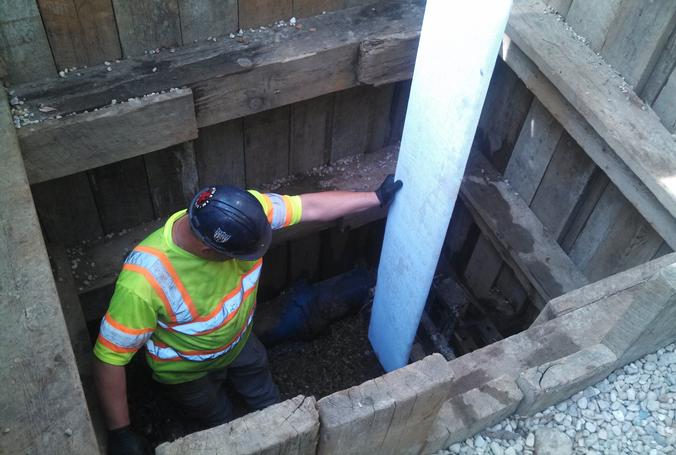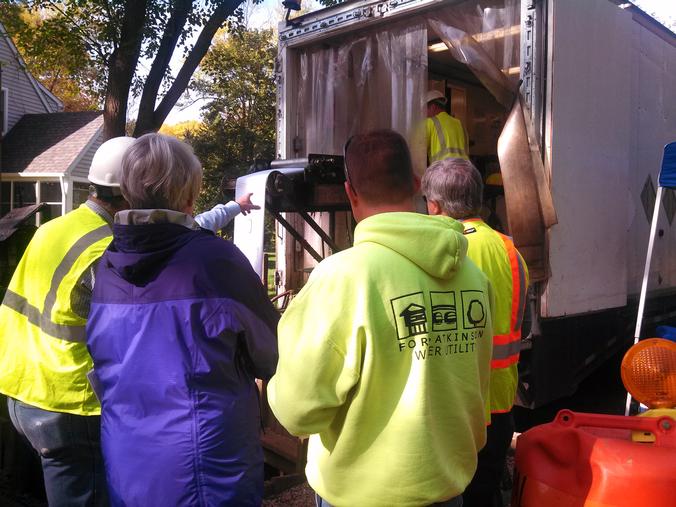Madison Water Utility builds new water mains -- inside the old ones
posted

Embracing new technology
Imagine Badger Rd. completely gutted – nothing but dirt and gravel, impassable for months. Same story for West Mifflin St. and Lake Mendota Drive. It's what would have happened had Madison Water Utility chosen to dig up and replace the aging water mains that run beneath those streets.
"We'd be actually digging a trench the length of the project. So you'd have an open ditch," describes Don Russell, a lead-worker with the utility.
Utility equipment operator Bob Kempfer estimates the work would have taken about three months on Badger Rd. alone. "They would have to tear it out curb-to-curb and reroute traffic."
But it didn't happen that way. Instead, Madison Water Utility is embracing a new technology called cured-in-place pipe (CIPP) rehabilitation, or simply pipe relining.
"You can essentially construct a new pipe inside of an existing deteriorated pipe," explains design engineer Adam Wiederhoeft. "We can rehabilitate a main that maybe has characteristics like adequate size, but it maybe has a lot of breaks ... We can reinvest in the deteriorated infrastructure and bring it new life at a lower cost."
Faster, cheaper, easier
Madison Water Utility was the first water utility in Wisconsin to use CIPP rehabilitation, and its third project – the rehabilitation of mains beneath Badger Rd., West Mifflin St., and Lake Mendota Dr. – started in September (take a look at YouTube video of the construction below).
Wiederhoeft estimates going with CIPP for the project is about 25 to 30% cheaper than digging up and replacing the aging mains. But he says re-lining water mains isn't just about saving money.
"We are going to be able to complete all three projects, start to finish, in about 6 or 7 weeks, whereas a traditional replacement would be twice as long as that. It would have been a very challenging traffic control issue and site access issue."

The work is getting plenty of attention from folks who live those neighborhoods and have been dealing with main breaks for years.
"I'm relieved they're not tearing up the road. We just finished with all that construction on University," says one woman who lives on Mendota Drive and stood outside one cool morning to watch crews reline the main under her street. "It looks like they know what they're doing."
Also keeping close watch on the project are representatives from other water utilities in Wisconsin.
"Since our (first) project, several other cities in Wisconsin have pursued cured in place pipe rehabilitations and additional cities are monitoring our progress," says Wiederhoeft.
Planning for the future
Cities across the country are grappling with drinking water infrastructure that has reached the end of its useful life – much of it installed in the post-World War II boom more than 60 years ago. According to the American Society of Civil Engineers (ASCE), there are about 240,000 main breaks nationwide every year, and the number is growing.
Madison Water Utility is working to stay ahead of the curve with its long-range infrastructure plan, which calls for replacing or relining more than 400 miles of deteriorating pipeline over the next 40 years. But it won't be easy or cheap. At a cost of $950,000 per mile, replacing water mains is a significant and growing expense for the utility, adding up to millions of dollars a year.
But ASCE warns in a 2013 report that failing to act now to fix our infrastructure will be much more costly for our children and grandchildren:
Well-maintained public drinking water and wastewater infrastructure is critical for public health, strong businesses, and clean rivers and aquifers. Up to this moment American households and businesses have never had to contemplate how much they are willing to pay for water if it becomes hard to obtain.
... capital spending has not been keeping pace with needs for water infrastructure, and if these trends continue, the resulting gap will only widen through 2040. As a result, pipes will leak, new facilities required to meet stringent environmental goals will be delayed, (operations and maintenance) will become more expensive, and waters will be polluted.
